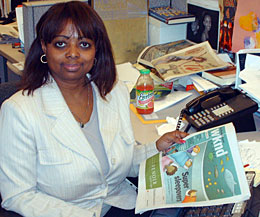Deirdre Childress ’81 has a message for all journalists, young and old: Know your multimedia.
The Weekend magazine editor of the Philadelphia Inquirer, Childress was recently elected secretary of the National Association of Black Journalists (NABJ). One of her platform prongs focused on job retention for journalists of color, something she said can be improved by teaching them to be web savvy.
“The digital generation is so far ahead of the current [working] generation, so one of the areas we need to work on is to give mid-career journalists more digital training,” she said. “Journalists of color are hitting a ceiling. People are living a long time and they won’t be competitive in their careers if they’re not qualified to move up.”
Although she’s considered herself a writer since the age of 13, and she wrote for the łÉČËÍ·Ěő Maroon-News, Childress got her first real taste of the profession while interning at the Los Angeles Times through a communications study group.
Two weeks after graduation, she officially began her reporting career at the Syracuse Post Standard. Since then, her extensive experience has included reporting and editing for the Washington Post, Los Angeles Daily News, and United Press International.
 |
| Deirdre Childress ’81 wrote for the Maroon-News while at łÉČËÍ·Ěő. |
As the profession changes and the fate of print journalism is uncertain, Childress is working to increase the representation of minorities in the newsroom. Through her work with the NABJ, she hopes to improve the grim statistics that reflect decreasing numbers of journalists of color.
“When you look at the surveys, you find that although the population of the U.S. is increasingly becoming browner and includes more minorities, the number of minorities in the newsroom is shrinking,” she said.
To improve diversity in the journalism workforce, the NABJ has been meeting with top news organizations like the Associated Press to discuss solutions. One proposed measure is for the NABJ to provide a short list of top-qualified candidates of color to companies when positions become available.
“We’re going to give them names of people who we know can do the job and see if we can make a real difference in that area,” Childress said. Through networking and improved multimedia training, the NABJ hopes to turn those statistics around.
Childress also stresses the importance of multimedia training with the young journalists she mentors through Temple University and a regional high school mentorship program originated by NABJ founder Acel Moore.
“I tell them right off the bat that they need to not just be able to write a great story, but they also need to be able to take pictures and learn how to do video. They need to be an all-purpose, one person reporting system.”
Mentorship has been a symbiotic relationship, Childress said, because it helps her keep current, too. She participates in any workshop that comes her way, but Childress said the real learning experience comes from the students she mentors.
“Staying around younger people, you learn from them. I don’t think of it as, I’m imparting all this wisdom on students; I learn from them and it’s equally beneficial.”